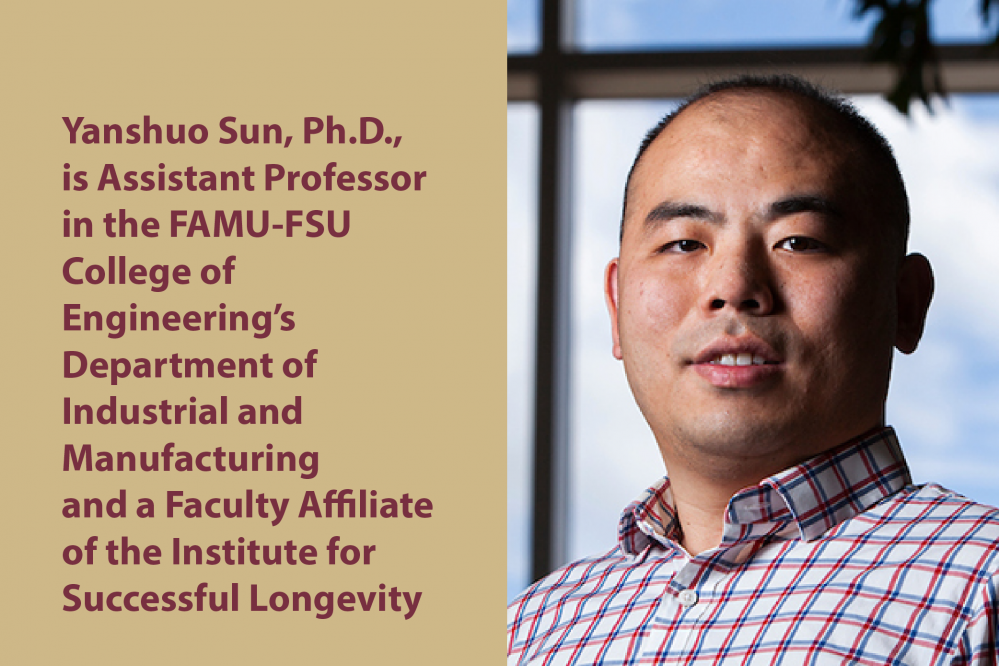Transportation-disadvantaged individuals have vital mobility needs. For some, getting to a medical appointment, employment, school or other life-sustaining services can be a daunting barrier due to a disability, age or income. There are many challenges to providing and accessing reliable transportation — a problem engineering researchers look to mitigate with a new platform.
A multi-university team of researchers led by Yanshuo Sun from the FAMU-FSU College of Engineering will conduct a new three-year National Science Foundation-funded project to promote social equality and improve transportation accessibility for millions of transportation-disadvantaged people. Sun, an assistant professor in the college’s Department of Industrial and Manufacturing and a Faculty Affiliate of the Institute for Successful Longevity, is principal investigator for the project involving Florida A&M University, Morgan State University and the University of Utah.
The NSF project sprang from research Sun conducted with support from an Institute for Successful Longevity Planning Grant.
“The need is great,” Sun said. “We want to help the transportation-disadvantaged individuals overcome historical barriers with a technology-enabled new platform we call the Interoperable Transportation Service Roaming (ITS-R) System.”
The Dial-a-Ride concept is usually offered as an on-demand, door-to-door, or curb-to-curb transportation service for qualified riders. For transit providers, Dial-a-Ride services are usually provided as a supplement to their regular routes and within a fixed service area. Due to the specific equipment and scheduling needs of their passengers, transportation companies could benefit from a streamlined approach to scheduling other than simple on-demand requests for service.
According to the initial study, fragmentation in the market is one of the primary causes of poor traveler experience and systemwide performance. The research team hopes to overcome barriers with the new ITS-R System.
The ITS-R System enables independent mobility service providers to share their fleet and demand information, which may reduce operational costs and improve the level of service for riders, the researchers say.
By connecting requests in real-time with fleet availability on the road, researchers expect to introduce a new level of flexibility and efficiency into the Dial-a-Ride model at the community level.
“We want to optimize the services available to people and provide guidance for service providers based on real-world modeling data,” Sun said. “By streamlining services, riders can have a better experience and costs may be reduced for the service providers involved.”
The initial idea for the project came from the support of a planning grant from the Florida State University Institute for Successful Longevity. Sun had the chance to interact with Big Bend Transit and StarMetro, two paratransit service providers in the local Tallahassee region.
“The coexistence of the two service providers in our area gave us the idea that multiple service providers might be able to collaborate through an interoperable platform,” Sun said. “The idea eventually became a cornerstone of this project.”
Celeste Chavis, an associate professor in the Department of Transportation and Urban Infrastructure Studies at Morgan State University and co-principal investigator for the team, said, “We plan to demonstrate the effectiveness of the ITS-R System through computational experiments based on real-world data. Using algorithms, we can develop and test new vehicle routing and scheduling to evaluate the allocation and operation of inclusive autonomous vehicles."
Nikola Markovic, faculty at the University of Utah, will contribute his expertise in paratransit vehicle routing.
The researchers plan to provide a means for service providers to share information. They are also trying to see if riders will shift travel plans with external incentives.
“We hope to have a better understanding of how decision-making can be coordinated among Dial-A-Ride service providers and increase system efficiency,” Sun said. “No studies have examined how these providers can be redesigned to accommodate the challenges brought by the ITS-R Systems and the implications of emerging inclusive autonomous vehicles or IAVs.”
Sun explained, “There is limited understanding of the preferences that the travel disadvantaged population would need when the ITS-R System and IAVs become a reality.” Sun wants to collaborate with local and state transportation agencies to deploy the proposed system and to further pilot studies in Florida.
The research findings will also be integrated into undergraduate and graduate courses taught at the FAMU-FSU College of Engineering and Morgan State. A transportation software company, IT Curves, will provide internship opportunities for the students to further attract them to pursue their careers in the transportation industry.
This NSF grant is funded through the Historically Black Colleges and Universities-Excellence in Research (HBCU-EiR) program and will provide $658,942 in funding for the team.


